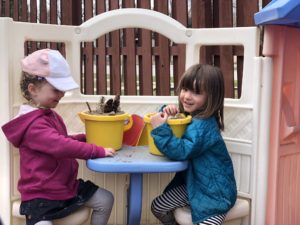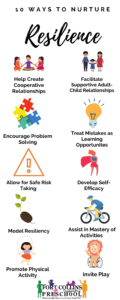 Most parents would agree that a child is entitled to thrive and develop to his or her full potential. However, there is disparity about how best to achieve this goal. Children’s early experiences, particularly caring relationships, physical activity, and cognitive stimulation determines his or her brain development and influences a range of skills, outlooks, behaviors, and learning capacities. Quality early education sets the foundation for a child’s future well-being and academic achievement. The formative years should promote resilience so children learn how to manage the challenges in life. Early Childhood is an important time to build resilience by developing positive attitudes, competencies, and skills such as self-regulation, empathy, self-confidence, and responsibility.
Most parents would agree that a child is entitled to thrive and develop to his or her full potential. However, there is disparity about how best to achieve this goal. Children’s early experiences, particularly caring relationships, physical activity, and cognitive stimulation determines his or her brain development and influences a range of skills, outlooks, behaviors, and learning capacities. Quality early education sets the foundation for a child’s future well-being and academic achievement. The formative years should promote resilience so children learn how to manage the challenges in life. Early Childhood is an important time to build resilience by developing positive attitudes, competencies, and skills such as self-regulation, empathy, self-confidence, and responsibility.
How does resilience relate to growth and development?
Resilience is the ability to adapt well in the face of adversity. Resilience is neither an inborn trait nor an all or nothing characteristic. Resilience occurs on a continuum. Age-appropriate, health-promoting activities can shape individual intrinsic characteristics of a child in a way that will build their resilience. When children are resilient they are braver, more curious, more adaptable, and more able to focus on learning and growing. Resilience is something that can be nurtured.
10 Ways to Nurture Resilience in Children
- Help create cooperative relationships, not uncompromising independence
- Facilitate supportive adult-child relationships
- Create opportunities for problem solving, building their diagnostic toolbox
- Remind them that mistakes are inevitable and not negative, but rather they are opportunities for learning
- Provide opportunities for safe, considered risks
- Build a sense of self-efficacy and perceived control
- Model resiliency for children
- Develop a framework of activities that build competency and mastery
- Allow time for physical activity as movement strengthens and reorganizes the brain, making it more resilient
- Aid development of their frontal cortex, which benefits judgement, impulse control, and self-regulation
Seven C’S of Resilience
One of the most comprehensive categorizations of strategies for building resilience in young children is the 7 crucial C’s proposed by Ginsburg and Jablow. These ingredients of resilience are interrelated and interwoven forming a web.
- COMPETENCE: When we notice what young people are doing right and give them opportunities to develop important skills, they feel competent. We undermine competence when we don’t allow young people to recover themselves after a fall.
- CONFIDENCE: Young people need confidence to be able to navigate the world, think outside the box, and recover from challenges.
- CONNECTION: Connections with other people, schools, and communities offer young people the security that allows them to stand on their own and develop creative solutions.
- CHARACTER: Young people need a clear sense of right and wrong and a commitment to integrity.
- CONTRIBUTION: Young people who contribute to the well-being of others will receive gratitude rather than condemnation. They will learn that contributing feels good and may therefore more easily turn to others, and do so without shame.
- COPING: Young people who possess a variety of healthy coping strategies will be less likely to turn to dangerous quick fixes when stressed.
- CONTROL: Young people who understand privileges and respect are earned through demonstrated responsibility will learn to make wise choices and feel a sense of control.
Adapted from Ginsberg and Jablow
The Value of Play
The social, cognitive and physical benefits of play are relevant to resilience as play helps children develop the Critical Seven C’s by creating opportunities for problem solving, exercising imagination and creativity, negotiating with others, experiencing and managing a range of emotions, and developing independence and a sense of control.
Play is childhood’s inborn tool to build resilience (Ginsburg and Jablow 2015) Children do not have to be taught how to play; it is instinctive, voluntary, and often spontaneous. Play, particularly free and explorative play, is children’s means of learning and helps children “know” through experience rather than by direct instruction (Else 2009). Play allows children to try varied strategies to solve problems and to further flexibility through trial and error. The more children play, the more competence they develop and the more control they have over themselves and their environment. This creates a sense of mastery and an ability to persevere in the face of adversity.
Play-based learning benefits children in the early years by;
- Encourages Language Skills – A child’s vocabulary grows as they play and have a need to express their ideas. Adults have the opportunity to support language development through play. They can ask questions, encourage conversations, and introduce unfamiliar words. The context of play allows for this to happen in a natural way relevant to the child’s interests.
- Supports Pre-literacy Skills – Play involving music and rhyme enhances listening skills and sound recognition. Using materials to represent objects during play is the beginning of symbolic play, which holds great value in developing cognitive skills.
- Develops Skills in a Relevant Manner – This builds a strong foundation for more abstract future learning.
- Fosters Creativity and Imagination – Using their imaginations children are able to find a solution to a variety of problems they encounter. Fostering imagination is fundamental to developing curiosity and connection.
- Develops Social and Emotional Skills – Playing cooperative games brings children joy as they enjoy the experiences with friends. It also aids in developing a sense of belonging to a community. Without connectedness children will find it difficult to engage in learning.
It is important to remember that play needs to be freely chosen and bring enjoyment to children. Learning through play creates a brain that has increased flexibility and improved potential for learning later in life.
Conclusion
Ensuring that children have strong social competence skills is a critical step toward helping children develop the skills and behaviors they need to demonstrate positive adaptation and thus to be resilient. The ability to develop positive relationships, has been linked to play-based learning. As children play with each other they learn to compromise and negotiate, resolve conflicts, and use words to communicate. Emotional competence and empathy are developed through play as children learn about the feelings, emotions, and motivations of others. Exposure to stress is inevitable. Equipping children with strong social and emotional competence skills is a crucial step towards helping children create and maintain flexibility and resilience that will help them to cope with and even thrive in the face of life’s many challenges. Children who are resilient are more likely to persevere when they face learning challenges and to see those challenges as obstacles that can be overcome, rather than obstacles that interfere with their progress.
Written by : Lori Bonnema – Director of Fort Collins Preschool
